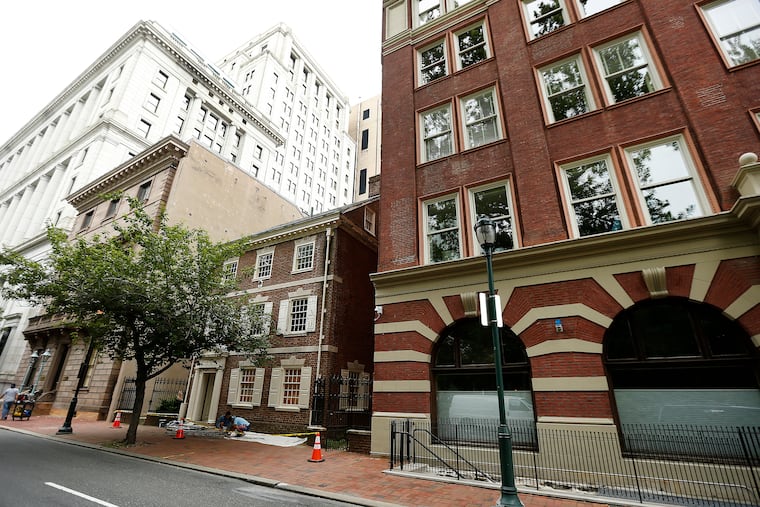A new Washington Square high-rise? Philly developer tries again to build condo tower over Dilworth House
Philadelphia developer John Turchi has pulled two zoning permits that would allow a buidler to demolish part of the Dilworth House and build a 10-unit condo tower on the site.

A 12-story condo tower could soon rise above Philadelphia’s historic Dilworth House, according to zoning permits that were issued last month, potentially filling in the last developable lot on Washington Square.
Philadelphia developer John Turchi and his wife, Mary, applied in December for two zoning permits, records show, one that would consolidate the Dilworth House property into a single lot and another that would allow partial demolition of the structure to make room for a 10-unit tower.
Both zoning permits were approved in mid-December, according to Karen Guss, spokesperson for the Department of Licenses and Inspections. She added that, before demolition could begin, approval would be needed from both the Historical Commission and the Art Commission.
Turchi’s high-rise proposal is the latest attempt by the developer to get a project at the Dilworth House off the ground — and, if he is successful, would add more pricey units to Philadelphia’s growing luxury real estate market. One of Turchi’s lawyers, Philip Rosenzweig, of Silverang, Donohoe, Rosenzweig & Haltzman LLC in St. Davids, said that the project would “obviously be very high-end” and would feature an automated valet parking system underground that could accommodate 20 spaces, zoning documents show. The tower, which would rise behind the front portion of the Dilworth House, would include a roof deck, balconies, and amenity spaces, according to the documents.
In an interview Tuesday, Rosenzweig said that although Turchi conceived the plan, he has not yet decided whether he will be the builder. Several parties are interested in developing the tower, Rosenzweig said. There is no agreement of sale in place, and Rosenzweig said Turchi had no comment.
In 2017, Rosenzweig told the Inquirer that Turchi was “quietly” marketing the property and that he had “no intention of relinquishing” his idea for developing the site. Still, the Dilworth House, located at 223-225 S. Sixth St., has been beset by controversy for more than a decade — and there is no guarantee that Turchi’s proposal will not face the same again.
Paul Boni, chair of the Society Hill Civic Association’s Zoning and Historic Preservation Committee, said the group has “a team of people reviewing the materials and has engaged an outside attorney for the matter.”
In 2001, real estate documents show, Turchi and his wife purchased the Dilworth House from the Philadelphia County Dental Society for $1.75 million, with reported plans to renovate and move in. Those plans, however, shifted a few years later to demolition, and then partial demolition, to make room for a 16-story tower, designed by prominent architect Robert Venturi.
The house, located today in one of Philadelphia’s priciest real estate markets, is worth saving, residents argue today and previously. It was built as a primary residence for Mayor Richardson Dilworth in the late 1950s when Society Hill was languishing as a sign of his commitment to improving the area. The property is in the Society Hill historic district and classified as “significant.”
Turchi, however, has said the house is not historic. In an interview with the Inquirer in 2005, he said, “It’s in the wrong place, and it represents the wrong time.”
Residents were opposed to Turchi’s assessment — and fought to keep the property intact. A nearly decade-long legal battle involving Turchi, the city, and residents ensued, until finally, in 2015, the Commonwealth Court upheld the Historical Commission’s decision: The Dilworth House’s rear wing could be demolished, so long as the front section, including the facade, remained.
Even so, no development ever happened — something many developers and observers have attributed to contentious history surrounding the property, as well as the physical limitations of the site.
According to the city, Turchi’s current plans can be built under current zoning as long as he receives the Historical and Art Commission approvals.
Plans submitted to the city show that the project’s height would be about 172 feet tall, and that the tower would be connected to the home’s facade. A different architect has been hired, Rosenzweig said. Some of the units appear to extend into the Dilworth House itself, according to the drawings.